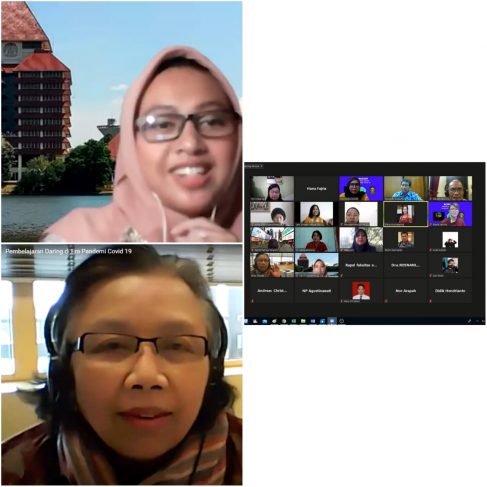FEB UI Lecturers Teach Online Learning Methods in the Pandemic Era to Lecturers in Palangka Raya
Hana Fajria – Public Relations of FEB UI
Depok – (12/8/2020) The COVID-19 pandemic continues to spread and impacts on several policies including on learning patterns, both administrative mechanisms, and communication systems or individual meetings. Elvia R. Shauki, Ph. D and Desti Fitriani, SE., Ak., CPMA, CA., MA, researchers and teaching staff at the Faculty of Economics and Business, Universitas Indonesia, held a workshop entitled “Online Learning in the Era of the Covid-19 Pandemic,” and at the same time became speakers at the event , moderated by Vivi Pancasari, SE., M.Si from STIE YBPK. This online activity was initiated by Elvia and Desti as part of the FEB UI Lecturer community service program at STIE YBPK Palangkaraya.
This event aims to improve the ability of lecturers in delivering learning materials, which will also lead to improving the quality of graduates. The resource person delivered several materials, including introducing alternative online learning platforms, online learning challenges and aspects of online learning pedagogy.
Elvia started the presentation on problems, challenges and opportunities in online teaching – a new normal phase, the global Covid-19 pandemic. “What needs to be paid attention to in this new normal is that during this transitional period, it is important to master technology and then increase the ability to speak without an audience, to make it more interesting, by preparing good communication. In order for the interlocutor (students) to receive the knowledge given, there are 7 points that must be considered during the learning process, such as continuing to use masks, stigma in language and social inclusion, creating study groups, paying attention to attendance, sharing infrastructure, paying attention to existing technology, and cleanliness. Furthermore, there are 12 principles of pedagogical aspects (Mayer, 2017) that must be considered, namely, coherence, signaling, redundancy, spatial contiguity, segmenting, pre-training, modality, multimedia, personalization, voice, and the image principle. The learning system can be combined with face to face, synchronous or asynchronous,” she said. Elvia added, a good communication tool for this type of learning is the zoom application.
The second resource person, Desti, shared insights to maximize the use of alternative online learning platforms during and after the Covid-19 pandemic. Started with a presentation on the Learning Management System (LMS), a software system designed to assist lecture management, particularly helping teachers and participants to administer computerized learning. This system is available in paid or open source (free).
Quoting Malikowski, Thompson and Theis, 2007, there are 5 important features that are ideal in learning management system, such as:
- Able to transmit course content categories: course content, announcements and gradebooks
- Able to create discussion categories: asynchronous discussion vs synchronous discussion
- Able to evaluate student categories: test generator, which helps instructors produce course assessments and allows students to submit tests via the drop box function
- Evaluate courses and instructor categories: evaluate courses and instructors at the end of the semester
- Create computer-based instruction: various options and features available in the LMS for instructors to choose from.
Furthermore, Desti provides several online learning platforms and displays the stages of using these platforms, including Microsoft Team, Google Classroom and Cisco WebEx.
“There are many ways to do online learning. Although there are limitations, we can choose which one is the most appropriate for our organization, there are paid and free alternatives with their respective advantages and disadvantages. Nothing is impossible from a simple thing by utilizing the existing platform, everything can be used by participants and can be used in the learning process, this is our momentum,” concluded Desti. (hjtp)






(am)

